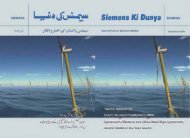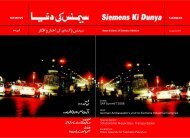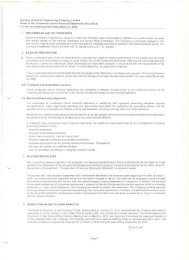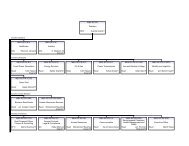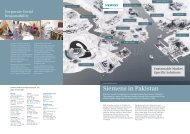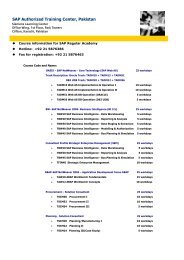Siemens Ki Dunya - Siemens Pakistan
Siemens Ki Dunya - Siemens Pakistan
Siemens Ki Dunya - Siemens Pakistan
You also want an ePaper? Increase the reach of your titles
YUMPU automatically turns print PDFs into web optimized ePapers that Google loves.
Miscellaneous<br />
Study Tours to <strong>Siemens</strong> <strong>Pakistan</strong><br />
As part of our CSR<br />
activities the<br />
company spends<br />
considerable<br />
resources in arranging<br />
study tours for<br />
students of Engineering<br />
Universities,<br />
Business colleges,<br />
Technical institutes,<br />
Technical institutes of<br />
the Armed Forces of<br />
<strong>Pakistan</strong>, Government<br />
and semi government<br />
organizations, Utilities<br />
and other organizations<br />
from across the<br />
country. For the<br />
majority of these<br />
institutions these<br />
tours are mandatory<br />
and part of their<br />
syllabus.<br />
34 <strong>Siemens</strong> <strong>Ki</strong> <strong>Dunya</strong> | August 2009<br />
The tours are coordinated<br />
throughout the<br />
company with the<br />
delegates being<br />
greeted on shop<br />
floors by concerned<br />
technical persons to<br />
answer any query.<br />
<strong>Siemens</strong> imposing<br />
Industrial complex<br />
has four factories on<br />
its premises i.e.<br />
Motors, Transformers,<br />
Switchboards and<br />
Diesel Generating sets<br />
including the 220 kV<br />
Transformer factory<br />
the only one of its<br />
kind in <strong>Pakistan</strong> that<br />
represents a great<br />
learning experience<br />
for the visitors.<br />
These tours add value<br />
to the knowledge of<br />
the visitors giving<br />
them an opportunity<br />
to see practical<br />
application of the<br />
theories they are<br />
taught. Here are<br />
glimpses of the tours<br />
in the last few<br />
months. Most of the<br />
groups are photographed<br />
with our visit<br />
coordinator<br />
Mr. Sohail Mehmood<br />
of CC.<br />
Performance Management<br />
By:<br />
Hiba Zaheer<br />
I DT Design<br />
Introduction:<br />
Performance Management<br />
encompasses<br />
such activities which<br />
ensure that goals and<br />
targets of an organization<br />
are met in an<br />
effective and prolific<br />
way.<br />
Therefore it is used to<br />
maximize the performance<br />
by accountability and motivate<br />
the people to do their best to increase<br />
the profit of an organization. The sources<br />
of accountability include performance<br />
appraisals, evaluations, discussions and<br />
the results that come because of their<br />
efforts. Hence it can be said that<br />
performance measurement is a part of<br />
performance management.<br />
What is Performance<br />
Management?<br />
As mentioned earlier, Performance<br />
Management helps to meet the goals of<br />
an organization in an efficient manner. It<br />
emphasises on the idea of judging the<br />
employees on the basis of the outcome<br />
they produce. For this employees must<br />
be trained as to how they can develop<br />
themselves and what is expected from<br />
them so that they will be able to improve<br />
their work methods.<br />
It is imperative to set goals, set a clear<br />
direction of work, and tell them how<br />
feedback is provided in order to have an<br />
effective Performance Management<br />
system. There should be a clear process<br />
of performance appraisal to check the<br />
development and growth of an employee<br />
which is purely based on the results<br />
produced not on their personalities.<br />
Why Performance<br />
Management?<br />
� Performance Management<br />
eliminates the “Look busy, do nothing,”<br />
concept. The performance of the people<br />
depends only on their attitude towards<br />
work and the results they produce for the<br />
profit of organization. The employee may<br />
be considered as loyal to the organization<br />
if he keeps himself busy with the<br />
mundane tasks leaving an impression on<br />
others that he/she has a lot to do,<br />
Performance Management eradicates<br />
this misconception.<br />
� An effective Performance Management<br />
system helps in setting of goals of<br />
an organization and the efficiency<br />
needed to achieve it. Therefore the<br />
activities of the employees ensure the<br />
parallelism of activities with the goals of<br />
that organization.<br />
� Performance Management helps in<br />
ensuring that it depersonalizes the<br />
issues. In this kind of management, goals<br />
are set and work is planned, performance<br />
and attitude towards work is<br />
measured by the supervisor, it is then<br />
accounted via performance appraisals or<br />
evaluation forms then the one with a<br />
high rating will be rewarded.<br />
Therefore the whole judgment system<br />
will become unbiased differentiating the<br />
employees only on the basis of their<br />
performance rather than their personalities.<br />
� Accountability factor will motivate<br />
the employees to give their best and<br />
make positive use of the resources as<br />
much as possible.<br />
� Performance Management encourages<br />
communication between employee<br />
and supervisor via discussions and<br />
feedback.<br />
� Equitable treatment will be given to<br />
the employees irrespective of any favors<br />
so that he/she will not feel demotivated.<br />
� All the activities will be in alignment<br />
with the vision and mission of the<br />
particular organization.<br />
Types of Performance<br />
Management:<br />
There are several types of performance<br />
management depending on the area<br />
where this Performance Management<br />
approach is implemented:<br />
1. Business Performance<br />
Management:<br />
This type of Performance Management<br />
comprises of the methods that help in<br />
developing the efficient and effective<br />
use of manpower and available resources<br />
of the business units of an organization.<br />
2. Operational Performance<br />
Management:<br />
It refers to the discipline which focuses<br />
on the methods that help in improving<br />
the business performance among<br />
different organizations.<br />
3. Application Performance<br />
Management:<br />
It is a set of processes that refers to<br />
supervision and maintenance of the<br />
software application used in an organization.<br />
4. Project Performance<br />
Management:<br />
It is related to performances related to a<br />
specific project i.e. performances<br />
regarding scope of project, available<br />
resources, time frame in which that<br />
project should be completed etc.<br />
Value of Know-How<br />
A giant ship engine failed. The ship's<br />
owners tried one expert after another,<br />
but none of them could figure out how<br />
to fix the engine.<br />
Then they brought in an old man who<br />
had been fixing ships since he was<br />
young. He carried a large bag of tools<br />
with him, and when he arrived, he<br />
immediately went to work. He inspected<br />
the engine very carefully, top to bottom.<br />
Two of the ship's owners were there,<br />
watching this man, hoping he would<br />
know what to do. After looking things<br />
over, the old man reached into his bag<br />
and pulled out a small hammer. He<br />
gently tapped something. Instantly, the<br />
engine lurched into life. He carefully put<br />
his hammer away. The engine was fixed!<br />
A week later, the owners received a bill<br />
from the old man for ten thousand<br />
dollars.<br />
"What?!" the owners exclaimed. "He<br />
hardly did anything!"<br />
So they wrote to the old man a note<br />
saying, "Please send us an itemized bill."<br />
The man sent a bill that read:<br />
Tapping with a hammer...... ......... ........<br />
$ 2.00<br />
Knowing where to tap.......... ......... ......<br />
$ 9,998.00<br />
<strong>Siemens</strong> <strong>Ki</strong> <strong>Dunya</strong> | August 2009<br />
35




